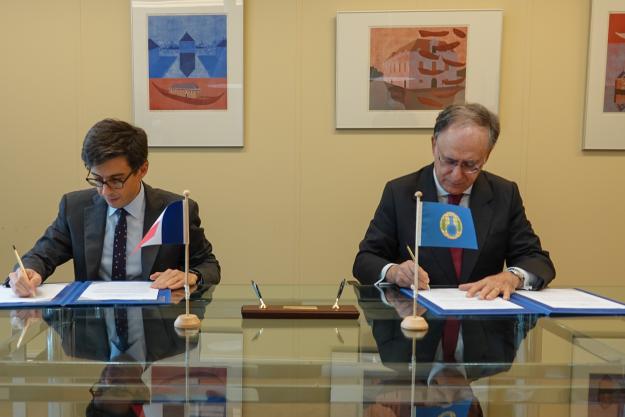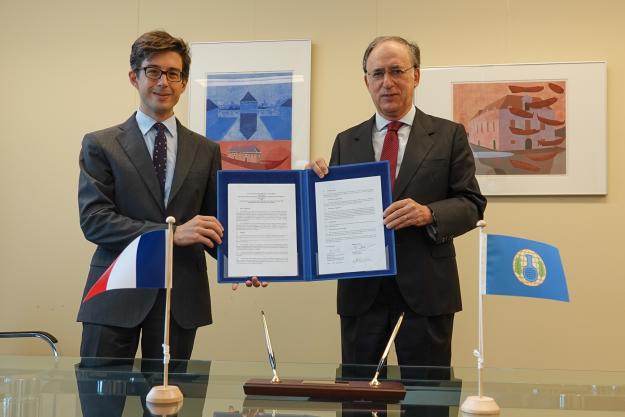
THE HAGUE, Netherlands –15 October 2021– The Government of the French Republic has contributed €230,000 to fund two special projects aimed at enhancing chemical safety and security, as well as further promoting the national implementation of the Chemical Weapons Convention (CWC) in Africa. These projects, targeting French-speaking countries in West Africa, have been designed in the framework of the “OPCW’s Programme to Strengthen Cooperation with Africa”, also known as the “OPCW Programme for Africa”.
The French voluntary contribution will be used to implement the following special projects:
- Project 1: “Strengthening mitigation capacities and preparedness to respond to chemical incidents in French-speaking West African States Parties”; and
- Project 2: Workshop for French-speaking African States Parties on the Role of National Implementing Legislation in Addressing Threats Arising from Non-State Actors.
The contributions were formalised during a ceremony held yesterday between the Permanent Representative of the French Republic to the OPCW, H.E. Ambassador Luis Vassy, and OPCW Director-General, H.E. Mr Fernando Arias.
Ambassador Vassy stated: “I am very honoured to announce today this voluntary contribution, aimed at supporting the OPCW capacity-building efforts in French-speaking States Parties in the African region. It is part of France’s commitment to the fight, alongside African countries, for international security and against terrorism. The projects financed will help strengthen the preparedness and response capacities of African states in the event of a chemical incident and in addressing threats from non-state actors. Adding to the €1,400,000 already contributed by France for the building of the Centre for Chemistry and Technology, this new contribution demonstrates France’s determination to invest in the future of the OPCW, whose expertise remains essential in preventing the re-emergence of chemical weapons. The ChemTech Centre will become a global repository of knowledge to that end and a platform for capacity-building support and international cooperation opportunities to Member States, for the pursuit of our collective security.”
The Director-General expressed: “Today’s additional contributions from France support, in a concrete way, the OPCW’s capacity-building efforts for the benefit of African Member States in the framework of the Africa Programme. They also signal the commitment of France to promoting the benefits of the Convention in the region, including enhancing chemical safety and security. Implementing the Convention through adopting domestic legislation and taking the steps to be prepared against chemical threats are both positive contributions to regional and global security.”
Director-General Arias encouraged Member States to support other similar special projects announced last year by the Technical Secretariat under the OPCW Programme for Africa.

Background
The Programme to Strengthen Cooperation with Africa on the Chemical Weapons Convention — more commonly known as the Africa Programme — focuses on the particular needs of African Member States, including the promotion of peaceful and authorised uses of chemistry for a developed, safe and secure Africa.
The Africa Programme continues to be funded mainly through the OPCW regular budget. Extrabudgetary resources are also used to further expand the Programme’s depth, reach, and impact. In this context, specific activities have been attracting in‑kind and financial support from the Czech Republic, France, Germany, Switzerland, the United Kingdom of Great Britain and Northern Ireland, the United States of America, and the European Union. Moreover, in‑kind support has been provided by African Member States co‑organising activities under the Programme.
As the implementing body for the Chemical Weapons Convention, the OPCW, with its 193 Member States, oversees the global endeavour to permanently eliminate chemical weapons. Since the Convention’s entry into force in 1997, it is the most successful disarmament treaty eliminating an entire class of weapons of mass destruction.
Over 98% of all declared chemical weapon stockpiles have been destroyed under OPCW verification. For its extensive efforts in eliminating chemical weapons, the OPCW received the 2013 Nobel Peace Prize.
